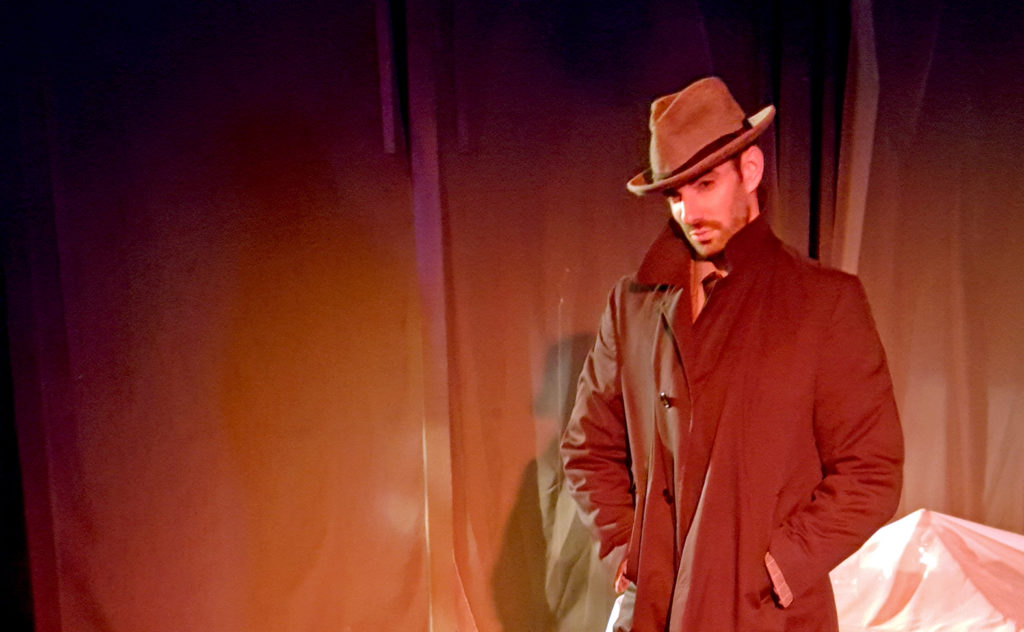Kadahj Bennett, Rachel Cognata and Michael Knowlton in Company One Theatre’s premiere production of ‘Hype Man’ (Source:Paul Fox/Company One)
EDGE MEDIA BOSTON – Let me preface this with the full disclosure that I only saw three-quarters of Boston’s 2018 theater season; my husband and I moved to Italy in late September, so I missed the final quarter of the year’s stage offerings. Does that disqualify me from writing a year-end Best Of list? I leave that to my editor to decide. My job here isn’t to mull such issues, but rather to recall, with no little sense of delight, the productions from 2018 that stood out, whether for technical bravura, indelible acting, elegant writing, or sheer guts… or some combination of all those things.
I’ll be back in Boston in a year, maybe two. Meantime, here’s the best of what I saw in 2018.
HYPE MAN, by Idris Goodwin; directed by Shawn LaCount — Verb (Kadahj Bennett), who is African American, is the Hype Man of the title, and of the three-member hip-hop act; Pinnacle (Michael Knowlton), is the white front man. The two have been friends since boyhood and hard-working would-be stars for a decade. Now, with the addition of a third — Peep One (Rachel Cognata), a woman of color — they are set to explode… until the commerce aspect of music abruptly clashes with the artistic nature, and duty, of their medium. (Company One)
‘Hamilton’ (Source: Joan Marcus)
DEAD MAN’S DIARY, by Igor Golyak and Zhenya Brodskaya; adapted from the unfinished novel by Mikhail Bulgakov; directed by Igor Golyak — This play unfolded with buzzing, hallucinatory energy within the confines of a peep-show-like box, a self-contained universe of ambition, frustration, and futility. What’s it all mean? This little world could be present-day Russia; the long-enduring art of theater; or the mind of a writer, which is, practically by definition, a chaotic and unpredictable place. (Arlekian Players)
HAMILTON, book, music, and lyrics by Lin-Manuel Miranda; based on the biography by Ron Chernow; directed by Thomas Kail — It took long enough, but impatient Boston theater fans got what they waited for when “Hamilton” came to town. This musical is a massively entertaining take on the life story of American Founding Father Alexander Hamilton, a picaresque hero with an absolute genius for politics. The musical clarifies history while defying it by casting African Americans in the lead roles; Hamilton’s fraught (and finally fatal) relationship with Aaron Burr (Nicholas Christopher) forms the backbone of the play. (Broadway in Boston)
Jared Reinfeldt as Casey in ‘The Legend of Georgia McBride’
THE BLACK CLOWN, by Davóne Tines & Michael Schachter, with music by Michael Schachter; based on the poem by Langston Hughes; directed by Zack Winokur — The history of race in America is deftly, sometimes shockingly, revealed as the horror show it is, in this world premiere musical that felt like an education as well as a prognostication; after all, the horrors not yet over. How do you do this through song and dance and still retain the power of the theme? You take it seriously; you got your music in the great traditions of spiritual, gospel, and jazz; and you let your smile glint with rage. And my goodness, this play has teeth. (American Repertory Theater)
THE LEGEND OF GEORGIA McBRIDE, by Matthew Lopez; directed by Russell Garrett — This rollicking comedy about an Elvis impersonator named Casey who discovers the power of drag (while not losing his heterosexuality, no less!) was wall to wall fun, swaddling comforting messages of inclusion, which were wrapped around still more fun. Stars Jared Reinfeldt (who played Casey) and Rick Park (who played his drag mother, Miss Tracy Mills) stood at the head of an impressive pack of actors that also featured Alex Pollock, Jade Guerra, and Ed Peed. (Greater Boston Stage Company)
Danny Burstein and company members of ‘Moulin Rouge! The Musical’ (Source:Matthew Murphy)
JAGGED LITTLE PILL, by Diablo Cody, based on the Alanis Morissette album (with Music by Alanis Morissette & Glen Ballard; lyrics by Alanis Morissette) with Additional Music by Michael Farrell and Guy Sigsworth; directed by Diane Paulus — Musicals based on movies? Okay, those have been around forever. Jukebox musicals that draw on the catalogs of a single group or songwriter? We’ve gotten used to those, too. But a musical based on a single album? Well, why not? Book writer Cody Diablo fashions a hot button-studded family drama around the set list of Alanis Morrissette’s classic ’90s record. This being a Diablo project, the story has some punch to it, ranging from prickly to spiky to skewering. Standout co-star Lauren Patten as Jo was deliciously ambiguous in every way that counts. If you weren’t a fan of the album, you probably became one by the time the curtain fell. (American Repertory Theater)
MOULIN ROUGE! THE MUSICAL, by John Logan, based on the Baz Luhrmann film; directed by Alex Timbers — The world premiere / pre-Broadway run of the stage adaptation of Baz Luhrmann’s pop-opera movie gave the summer an extra jolt of heat when it opened at the freshly-refurbished Emerson Colonial Theatre in July. The story: An American in Paris stumbles into a theatrical writing gig, and falls in love with his leading lady — who is also the favored prostitute of a nobleman whose blood is both blue and cold. Like the venue, the material was spiffed up and renewed, bringing songs into the mix that had not been written when Lurhmann’s film hit screens in 2001. This production was going to be a spectacle no matter what (or, ahem, “Come What May”), and expectations for full-on lavish theater were duly met. (Emerson Colonial Theatre)
Elise Arsenault, Jeff Marcus, Caroline Lawton, Rory Lambert-Wright, and Hayley Spivey in the Lyric Stage Company’s production of ‘Virginia Woolf’s Orlando.’ (Source:Mark S. Howard)
GUARDS AT THE TAJ, by Rajiv Joseph; directed by Gabriel Vega Weissman — Playwright Rajiv Joseph examines the top-down corrosive effects of absolute power in a play that brought gruesome new meaning to the term “two-hander.” The time: 1648. The place: India… specifically, right by the monumental and ethereally beautiful Taj Mahal, only just now completed. (Underground Railway Theater)
VIRGINIA WOOLF’S ORLANDO, by Sarah Ruhl; directed by A. Nora Long — Virginia Woolf’s extended love letter and feminist puzzle box of a novel has had many incarnations, including a Sally Potter film version, but Sarah Ruhl’s 2010 stage adaptation is probably the best of the bunch. Born a man, mysteriously transmuted to a woman, and blessed with eternal life, Orlando spends his / her life seeking love and wisdom — and finds completion in the humblest, most satisfying way. This production, directed by A. Nora Long, felt like a cure for those of us who have found the other interpretations, like the source material, to be a headache. (Lyric Stage Company in collaboration with The Suffolk University Theatre Department)
AN EDUCATION IN PRUDENCE, by Stefan Lanfer; directed by Pascale Florestal — This premiere production took a chapter out of Connecticut history with an account of how a schoolteacher attempted to operate a school exclusively dedicated to the education of African American girls in the mid-19th century. Cue the haters. The play’s tropes were sometimes familiar (the cast played characters from both past and present and the characters sometimes seemed to transpose into one another in time-defying ways) but the point it made needs endless reiterations: The struggle against bigotry is far from new, and far from won. The venue — St. John’s Church in Jamaica Plain — added to the play’s historic and narrative power. (Open Theater Project)
RIPE FRENZY, by Jennifer Barclay; directed by Bridget Kathleen O’Leary — Playwright Jenifer Barclay draws sharp contrasts between the Americana of “Our Town” and the deadly nightmare of today’s crisis of mass shootings, many of them taking place at schools. This play was first produced in 2016, but its message was kept up-to-the-minute by references to what was, at the time of its production last February and March, the latest tragic school massacre. Featuring a memorable ensemble (Reilly Anspaugh, Veronika Duerr, Stacy Fischer, Henry B. Gardner, and Samantha Richert) and haunting design work, this play’s power didn’t fade away with the immediacy of the headlines it touched upon; it rings in memory still with an undiminished sense of urgency and sadness. (A co-production of Boston Center for American Performance and The New Repertory Theatre)
TWO JEWS WALK INTO A WAR…, by Seth Rozin; directed by Will LeBow — Joel Colodner and Jeremiah Kissel, under the direction of a third accomplished actor of the Boston stage, commanded this production with broad comedy and deep pathos as a pair of Jewish men in war-torn Afghanistan trying to reconstruct their temple’s destroyed Torah from memory. In doing so, they investigated the nature of faith: It’s more than buildings, which can be wrecked, or scrolls, which can be lost. (New Repertory Theatre, Mosesian Center for the Arts)

Paul Melendy as ‘Little H’ in ‘Noir Hamlet’ (Source:Centastage)
NOIR HAMLET, by John Minigan; directed by Joe Antoun — “Little H” sets out to investigate the case of his own father’s suspicious death… and his mother’s remarriage. Who put him on the case? His father’s ghost, that’s who — to the strains of a lonely jazz saxophone. Director Joe Antoun and star Paul Melendy, along with fellow cast members Liz Adams, Robert D. Murphy, and Cristhian Mancinas-Garcia, reminded us why we wait with such pleasurable anticipation for every Centastage production. They aren’t frequent, but they hit the sweet spot. (Centastage)
Regine Vital and Rachel Belleman in ‘Antigone’ (Source:Flat Earth Theatre)
ANTIGONE, adapted by Lewis Galantie from the play by Jean Anouilh; directed by Lindsay Eagle — This production is on my list because it was probably 2018’s most instructional, and most memorable offering, thanks to nearly insurmountable challenges. Not that it lacked for expertise or ambition; it had both, and so much more to recommend it, from its inspired set design and staging to its meaningful history as a modern version of the classic Greek tragedy. Jean Anouilh wrote this work in France under Nazi occupation — and, if you know the plot of “Antigone,” you understand that in Anouilh’s case, more than most, the play really was the thing. Antigone defies her uncle Creon — an authoritarian, more like a dictator than a king — after he decrees that her brother will not be accorded a funeral, but rather be left lying dead on the field of battle, food for birds and dogs.
The Flat Earth production hit a major snag when it lost the actor who was to play Creon and then, as misfortune would have it, also lost the actor who was going to replace him. A truly last-minute substitution with no time to learn the lines put a brave actor in Creon’s shoes, and left him clutching a tablet device from which he had to read his lines — an awkward, but ultimately fitting, turn of events that reminded us what it takes to live up to the credo “the show must go on.”
Anyone who loves live theater will have seen this, or something like it, happen. Actors forget their lines; actors step in with little or no chance to learn their parts; actors take sick in the middle of a performance and the rest of the cast have to scramble to divide up his dialogue amongst themselves, deciding on the fly who will say what and hoping it will all make sense. Here and now we enjoy the kind of (relatively) stable existence that makes problems like these the exception, and also, typically, the worst case scenario, and the show goes on. But imagine what theater is like in countries torn by war; ground down by massive poverty or even starvation; crushed by ideologies so heavy and unforgiving that a play could be construed as an act of subversion (and, in some cases, that’s exactly the point of the play, produced in an act of indomitability and defiance). Imagine what theater will be like in the coming years in Brazil, under an authoritarian president who, during his political career, has openly called for the return of that country’s military dictatorship… and who now seems poised to make it happen. Imagine what it must have been like any place there are realproblems, life and death problems, to survive and to push back against with song, with poetry, and with the courage of storytelling.
Given today’s globally darkening political climate, the show really must go on… no matter the challenges, no matter the terrors and anxieties of the age, no matter what. Otherwise, we risk losing our souls along with so much else. Live theater can flourish on little more than a place to gather and a shared investment in a story. It’s the essence of civilization; everything else that’s come along is mere technological adaptation, but actors on the boards and an audience in their spell is the very wellspring. In some ways, “Antigone” was my favorite play of 2018, because of its timeless story of misrule and resistance, but also because it was a real-time, you-are-there lesson in the fluidity, adaptability, and invincibility of the theatrical spirit… which is also, I would argue, the human spirit. We are the stories we tell, and when we work harder and risk more to tell those stories, they mean that much more to us. (Flat Earth Theater)
By Kilian Melloy







